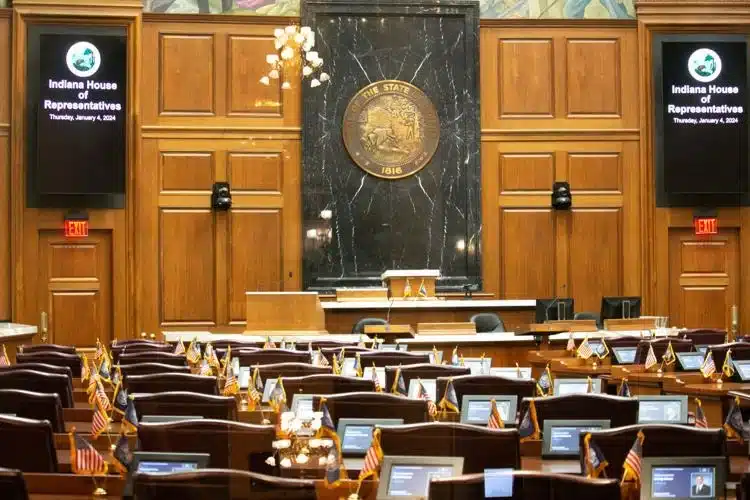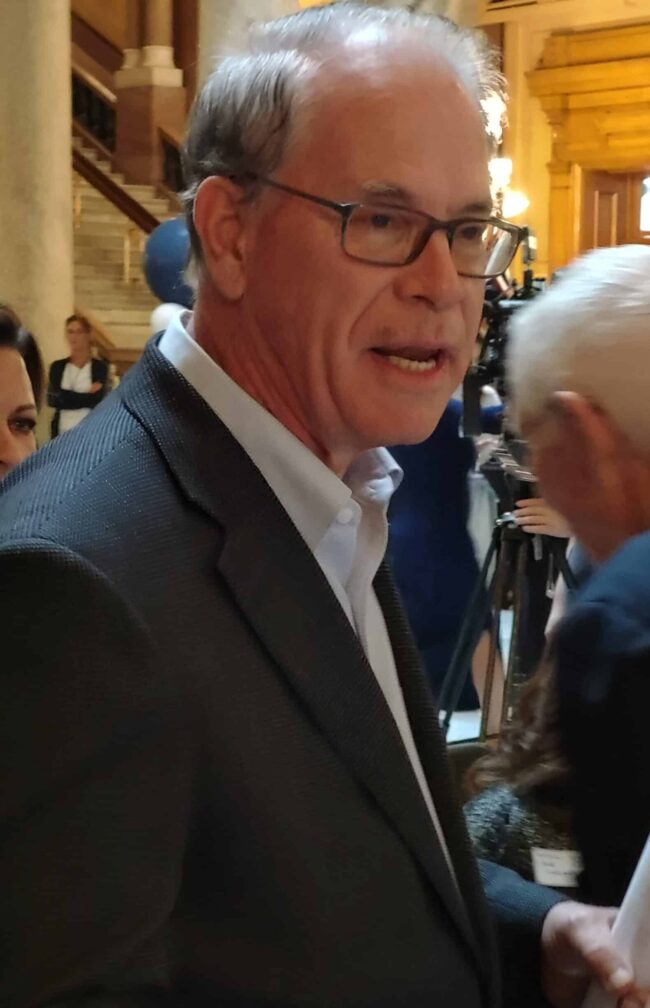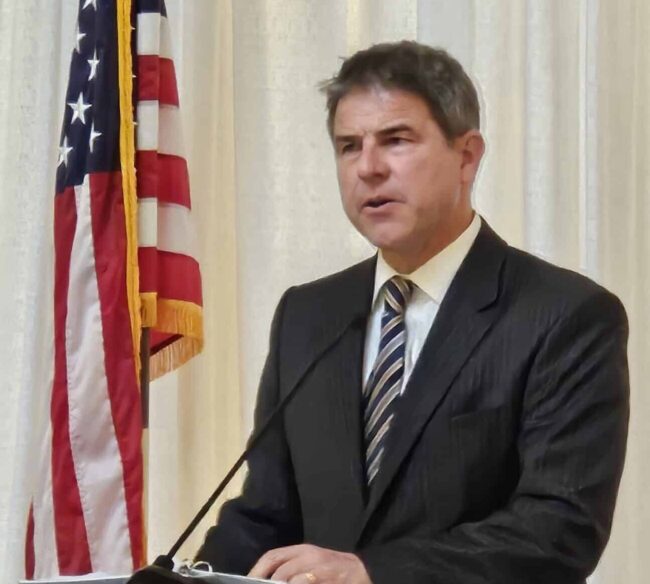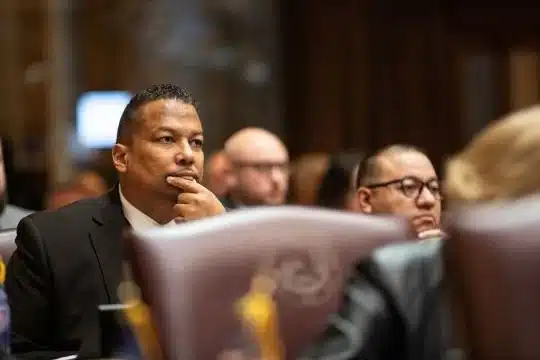
By Marilyn Odendahl
The Indiana Citizen
November 26, 2025
When Indiana lawmakers in both the House and Senate return to the Statehouse in December, the push to reconfigure the congressional district map may collide with the realities of the economy.
House Speaker Todd Huston, R-Fishers, and Senate President Pro Tempore Rodric Bray, R-Martinsville, released statements Tuesday afternoon, saying their respective chambers in the legislature would be reconvening at the start of next month to consider a mid-decade redistricting.
The House will gavel in Dec. 1 and the Senate will follow Dec. 8.
Gov. Mike Braun released a statement Tuesday on the social media platform X, saying the Indiana General Assembly , which has a GOP supermajority, needs to redraw the map so that all nine of the state’s congressional seats are held by Republicans after the mid-term election in November 2026. Currently, Democrats hold two seats with U.S. Rep. Frank Mrvan representing the 1st Congressional District in northwest Indiana and U.S. Rep. Andre Carson serving the 7th Congressional District, which covers most of Marion County.

“This Thanksgiving, I am grateful for both chambers of the Indiana General Assembly convening to vote on fair maps,” Braun said in his social media post. “Hoosiers deserve to have fair representation in Washington and now the General Assembly needs to deliver 9-0 maps which will help level the playing field.”
However, Indiana’s scramble to try to give an advantage to Republican candidates may not be enough to help the GOP retain control of Congress.
Aaron Dusso, chair of the political science department at Indiana University Indianapolis, noted Republicans will not only be facing the headwinds of history – since at least the 1940s, the party in the White House almost always loses seats in mid-term elections – but will also likely be burdened with uncertainty over the economy.
Even if the economy remains resilient in 2026, voters could still harbor fears about a recession or losing their jobs and take out their angst and anger at the ballot box, Dusso said.
The November report from The Conference Board indicated a general malaise about the economy as its Consumer Confidence Index tumbled 6.8 points from a reading of 95.5 in October to 88.7 in November, the lowest level since April. The drop was driven by consumers’ concerns over inflation’s continued grip on prices, the impact of tariffs, the labor market and their personal financial situations. Moreover, the agency reported, consumers were increasingly pessimistic about the future.
The Trump administration and the Indiana General Assembly would have few actions they could take to address any economic downturn or help voters feel better in time for the November election, Dusso said. So the Republicans, because they are in power, will get the blame, which, he said, could mean they might struggle just to hang on to the seven seats they currently have in Indiana’s congressional delegation.
“The reality is, if the economy continues to tank and the president’s approval rating stays around 40% or below, … we could end up in Indiana with three Democrats (in Congress) after the next election,” Dusso said.
In an interview with Politico, Bray nodded to the variables in the upcoming election, noting that redrawing the state’s congressional maps will not guarantee a Republican sweep of all nine seats. “In fact, I mean, if you really got too cute, you could find yourself at 6-3,” he said.
Indiana’s Republican state senators have been reluctant to toss the congressional map they approved in 2021 in favor of reconfiguring a new one this year. Some in the supermajority said that rather than redistricting, the GOP would be more successful by focusing its efforts on flipping the 1st Congressional District.
The Republican members of the upper chamber have remained split over redistricting, despite a full-court press by the White House, including phone calls from President Donald Trump and in-person meetings with Vice President JD Vance. On Nov. 14, Bray announced the Senate Republicans did not have the votes and, therefore, would not be convening for a special session the governor had called. Then, on Organization Day on Nov. 18, the official start of the 2026 legislative session, 19 Republican senators joined the 10 Democrats in voting for a continuing resolution that essentially said they would not reconvene until Jan. 5.
In his statement released Tuesday, Bray said the conflict over redistricting needs to be put to rest.

“The issue of redrawing Indiana’s congressional maps mid-cycle has received a lot of attention and is causing strife here in our state,” Bray said in a statement. “To resolve this issue, the Senate intends to reconvene as part of the regular 2026 session on Dec. 8 and make a final decision that week on any redistricting proposal sent from the House.”
Senate Minority Leader Shelli Yoder, D-Bloomington, accused Indiana Republicans of caving to Trump’s bullying. She said the supermajority is listening to “D.C. billionaires,” rather than their constituents, a majority of whom have said in multiple polls they do not support redistricting.
In blasting Republicans’ decision to reconvene in early December, the minority leader raised concerns about whether Hoosiers would get help with their struggles to pay their bills and keep food on the table.
“It raises a simple but devastating question: If Republicans will ignore their own voters to please Trump on something as serious as redistricting, what else will they ignore Hoosiers on?” Yoder said in a statement released on Tuesday. “Will they ignore Hoosiers as utility companies price families out of heating their homes, ignore parents who cannot find affordable child care to stay in the workforce, ignore renters and homeowners being pushed aside by out-of-state investors, and ignore the families watching health premiums climb higher than their paychecks because insurance companies keep hiking costs?”
Those economic issues, Dusso said, speak broadly to the entire electorate. While Americans are severely divided, politically, on a variety of issues, they all kind of unify around the economy, because everyone sees the high prices at the grocery store and gas pump and when they get their monthly electric bills. Republicans are going to have to address those concerns, but they will have a difficult time overcoming voter anger, he said.
Although state GOP lawmakers may be able to mitigate some of the fallout if they have a strong base in their districts, their biggest problem will be voter turnout, Dusso said. Solid Republican voters enraged and worried about the economy will not suddenly cast their ballots for the Democratic candidate, he said, but, rather, they will stay home on Election Day, lowering the number of votes for the Republican incumbents.
If the economy tips into a recession, Dusso said, Republicans will likely take an even bigger hit.
“Assuming we have elections that are free and fair in November of 2026, all of history suggests that this would be a complete wipeout for Republicans,” Dusso said. “They would be swept out of office, even at the state level.”
Bray has been widely criticized, including by Trump, for initially refusing to call the Indiana Senate into a special session as Braun had ordered. The intraparty brawl bubbled over when Sen. Mike Young, R-Indianapolis, in a speech on Organization Day, described the vote to not reconvene until the beginning of January a slap to the governor’s face. Also, Braun said he would support replacing Bray as Senate president and primary challenges to any legislator who voted against redistricting.
In the House, Huston has said for weeks that the Republicans in his chamber have the votes to approve a new congressional map. His statement Tuesday seemed to confirm that the votes are still there.
“House Republicans will gavel in on Monday, Dec. 1, reconvening the 2026 regular session,” Huston said. “All legislative business will be considered beginning next week, including redrawing the state’s congressional map.”
The Indiana Black Legislative Caucus has strongly opposed mid-decade redistricting, not only echoing the call for the General Assembly to turn its attention to economic issues but also raising fears that minority voters would be disenfranchised and silenced under a new congressional district map.

On Tuesday, IBLC chair Rep. Earl Harris Jr., D-East Chicago, said constituents are contacting state lawmakers about their struggles with such things as medical debt and rising utility costs and are not asking for a new congressional map. Also, he pointed out the potential upheaval that could be caused by redrawing those districts so close to the filing date for the 2026 election.
“If the state were to pass new congressional maps, the move would cause chaos for county clerks and local governments and unnecessary confusion for voters,” Harris said in a statement. “Come Dec. 1, I hope House Republicans take the time to consider the potential ramifications of mid-decade redistricting on Hoosiers and not move forward with any new maps.”
House Minority Leader Phil GiaQuinta, D-Fort Wayne, questioned whether Huston could unilaterally call the representatives to reconvene.
In a statement, GiaQuinta pointed out the lower chamber in the legislature adopted the same continuing resolution as the Senate did on Organization Day, which said the lawmakers would adjourn until Jan. 5. Even though Huston told House members to keep their calendars open in December because they might reconvene, GiaQuinta said the speaker could not override that resolution without the agreement of the minority leader, as required by state law and House rules.
“The Speaker has not asked, nor have I agreed to, changing the convening date,” GiaQuinta said. “The next day of the regular session is scheduled to be Jan. 5, not Dec. 1, and frankly, I ‘m surprised the Speaker forgot the House rules.”
Huston and Bray said because lawmakers were reconvening early, the legislature would end in February.
Sydney Byerly, reporter for The Indiana Citizen, contributed to this report.
Dwight Adams, an editor and writer based in Indianapolis, edited this article. He is a former content editor, copy editor and digital producer at The Indianapolis Star and IndyStar.com, and worked as a planner for other newspapers, including the Louisville Courier Journal.
The Indiana Citizen is a nonpartisan, nonprofit platform dedicated to increasing the number of informed and engaged Hoosier citizens. We are operated by the Indiana Citizen Education Foundation, Inc., a 501(c)(3) public charity. For questions about the story, contact Marilyn Odendahl at marilyn.odendahl@indianacitizen.org.